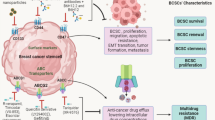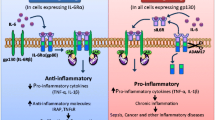Abstract
Decorin is a member of the small leucine-rich proteoglycan (SLRP) gene family that has recently become a focus in various areas of cancer research. The decorin protein consists of a core protein and a covalently linked glycosaminoglycan chain. Decorin binds to collagens type I, II and IV in vivo and promotes the formation of fibers with increased stability and changes in solubility. Further, the decorin core protein binds to growth factors, including transforming growth factor-β (TGF-β), to other intercellular matrix molecules such as fibronectin and thrombospondin, and to the decorin endocytosis receptor. Decorin may directly interfere with the cell cycle via the induction of p21WAF1/CIP1 (p21), a potent inhibitor of cyclin-dependent kinases (CDKs). Here, we discuss interactions of decorin with TGF-β and with p21, both of which are relevant to carcinogenesis and tumor progression. TGF-β is released by tumors of various histogenetic origins and promotes immunosuppression in the host and tumor immune escape by induction of growth arrest and apoptosis in immune cells, by downregulation of MHC II antigen expression and by changes in the cytokine release profiles of immune and tumor cells. Moreover, TGF-β may modulate tumor growth in an autocrine and paracrine fashion, may mediate drug resistance, and may facilitate tumor angiogenesis. Decorin binds to TGF-β, thus inhibiting its bioactivity, and is a direct or indirect negative modulator of TGF-β synthesis. Ectopic expression of decorin results in the regression of rat C6 gliomas, an antineoplastic effect attributed to the reversal of TGF-β-induced immunosuppression. On the other hand, de novo expression of decorin in colon cancer cells and some other tumor cells, even though not in glioma cells, results in an upregulation of p21 expression and a cell cycle arrest, presumably in a TGF-β-independent manner. Decorin expression is downregulated in many tumors but upregulated in the peritumoral stroma. By virtue of its growth regulatory and immunomodulatory properties, decorin promises to become a novel target for the experimental therapy of human cancers.
Similar content being viewed by others
Author information
Authors and Affiliations
Additional information
Received: 21 July 1998 / Accepted: 8 October 1998
Rights and permissions
About this article
Cite this article
Ständer, M., Naumann, U., Wick, W. et al. Transforming growth factor-β and p-21: multiple molecular targets of decorin-mediated suppression of neoplastic growth. Cell Tissue Res 296, 221–227 (1999). https://doi.org/10.1007/s004410051283
Issue Date:
DOI: https://doi.org/10.1007/s004410051283




